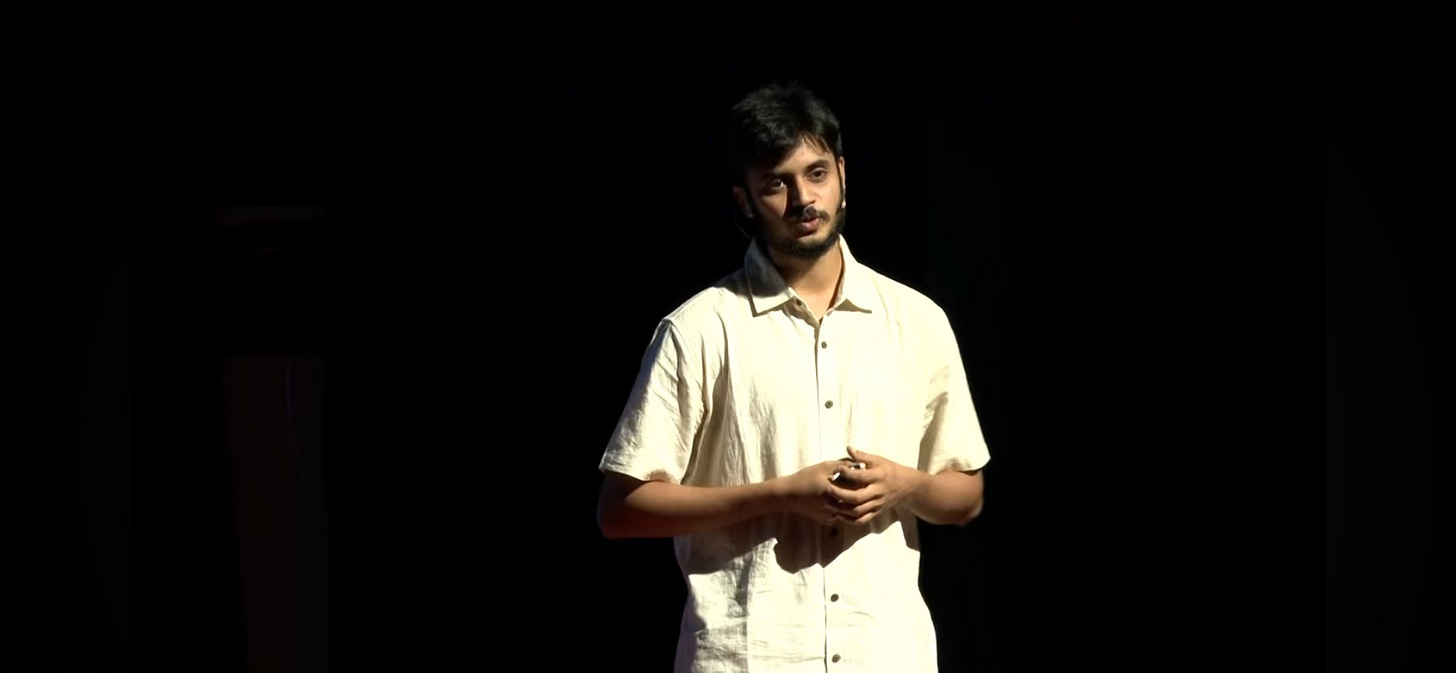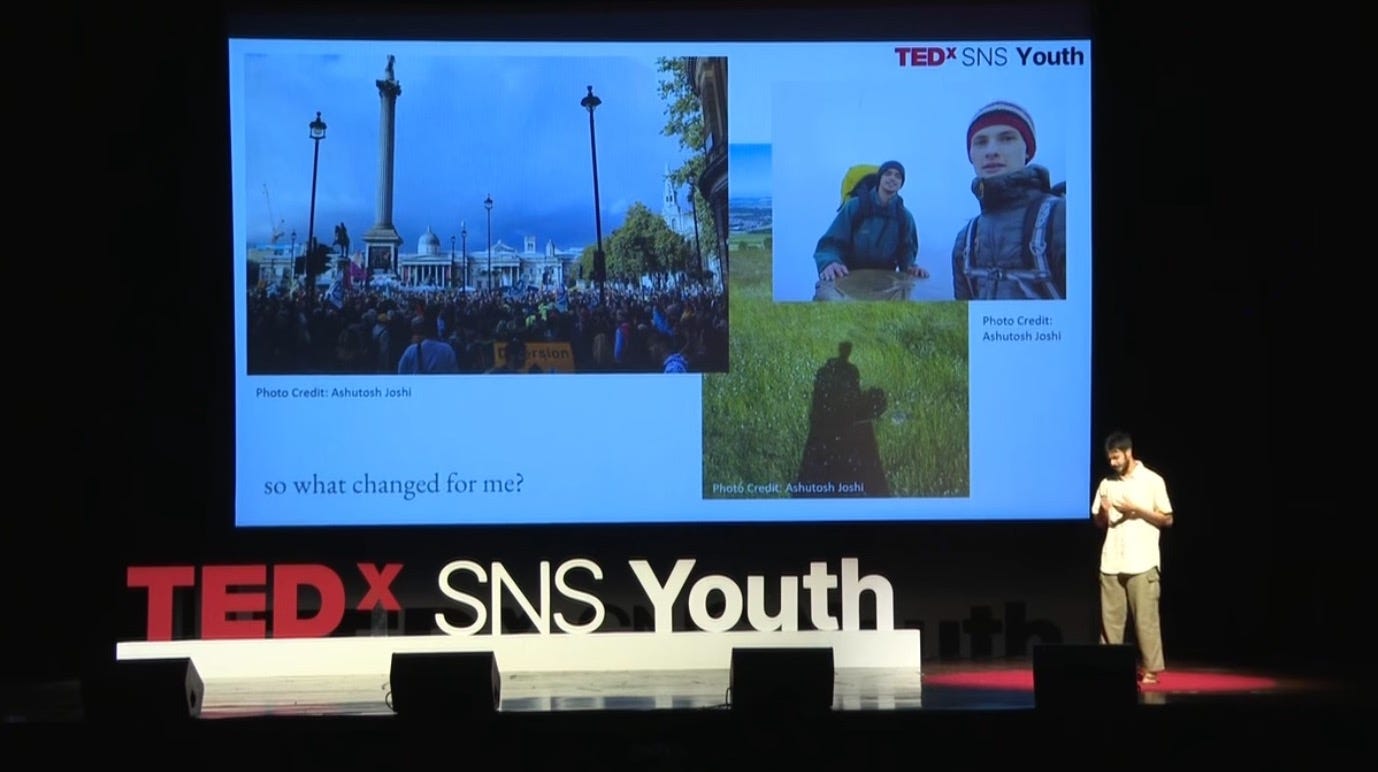(Re)discovering my country through a walk
The TEDx talk is now out on YouTube..
Hi, I know I have been inactive, but trust me, I have been writing some longer pieces which I will publish soon. In the meanwhile, I was invited to give a TEDx talk and that is now available on Youtube. Please go ahead and watch it. I thought about things that I could talk about and then realised that I can take this opportunity to actually speak about the country that I come from - what it meant to me and what we can all do about it.
Here’s the link-
Here’s the transcript for those to would like to read-
Let me ask you a question. What happens when you walk across a country—literally? Not just from place to place, but from one version of yourself to another.
Before you could take that first step across India, you’d have to build a companion…so I built this trolley: a strange, two-wheeled contraption of steel and hope.
Now, you’d be thinking, who is this guy? This question, Who am I? I have been asking myself for quite some time.
I grew up in a small Maharashtrian town, but my heart was in my ancestral village—a world of mango trees and grandparents. Society, however, pushed me down the expected path of the science stream. And yet, deep inside, I felt something missing. Not money or career. But a structure, a reason to say: “This is how I want to live.” I staged my first rebellion: I chose Arts over Science. It was my first step toward finding a life I could truly call my own.
Years later, I found myself sitting in a gallery in Mumbai, winning first prize for my photography. People lauded. But I felt hollow. Purpose still escaped me.
So, I kept walking—this time to Nepal, hiking the Annapurna re Circuit in cheap shoes, chasing some invisible truth at 18,000 feet. Then across India, from Rajasthan to Arunachal, hitchhiking, assisting photographers, meeting strangers who became friends. The more I traveled, the more I realized how little I knew about the country I called home—and even less about myself
Eventually, that path led me to England for higher education. I arrived as this wide-eyed Indian guy with a camera and questions. I slept in tents at climate protests, photographed outside 10 Downing Street, and thought, “Maybe this is it. My purpose!”
But meaning is slippery.
Then came COVID. The world froze. My family pleaded for me to return to India. But I wasn’t ready to go back to comfort. Instead, I moved to Huntly, a quiet town in Scotland, where I became a gardener. I spent my days working, and my afternoons walking—through hills, beside rivers, across vast open land. Scotland’s “right to roam” law gave me legal freedom, but it was the emotional freedom that changed me.
Out there, among strangers and silence, I discovered something I’d missed all along: Kindness. When you’re truly lost, a smile or a helping hand can anchor you more than anything else.
Just months before I went on the walk, I was just a guy, living a quiet, somewhat predictable life—studying in Cheltenham, England. I was working in Edinburgh, scrolling through the news in coffee shops with Americanos and overhearing more about Brexit than Bharat. I was far from the chaos of Indian politics, far from the heated television debates, and very very far from the lived realities of caste, religion, and the question of who gets to belong. But the distance didn’t protect me. It haunted me. The headlines kept coming: lynchings, riots, new laws, people divided along lines I thought we were moving beyond. And slowly, a restlessness began to grow in me—a question I couldn’t shake:
“Is this the India I come from? Or is there another India—one that’s quieter, kinder, still breathing beneath the noise?”
In time, I lived with saints on the Ganga, Benedictine monks in the UK, and Tibetan priests in Bir. Across religions, languages, and landscapes, I realized that people are people—everywhere. What truly matters is connection. Empathy. Presence. Place.
Eventually, I returned to India. But not to the life I left. My town had been devastated by floods. We had lost almost everything. Yet for the first time, I wasn’t angry. I felt called to rebuild—not just our homes, but the meaning of home itself. This, I realized, was my second chance. A life not built on expectation, but on purpose.
I tied my shoelaces on the edge of the Arabian Sea and began walking toward the Bay of Bengal. I walked to understand my country— its people and to understand myself.
So, I booked a one-way ticket for my parents to Rajasthan (hey, don't blame me. Its tough to convince Indian parents) and I decided to walk.
If Instagram had been my guide, I’d have expected every Indian to be either shouting on a panel or posing with a ring light and a chai cup. Thankfully, real India doesn't have filters—or hashtags.
At a time when India’s soul feels contested, when the idea of India as a plural, inclusive society seems to be under siege— I wanted to ask: Is that soul still there? And I wanted the answer not from news anchors or social media, but from the people of India themselves.
What I found on the road was revelling. I walked through villages, towns, cities where I was hosted by all kinds of people. They gave me food, shelter, directions—and stories. One night, I slept in a gurdwara in Nanded. In Ausa, a Muslim family fed me like I was their son. A few days earlier, Hindus welcomed me like family. No names, no labels – just pure humanity. You see, when you have preconceived ideas of the other person, it is hard to convince yourself that there can be good in them. That we can find a common ground.
I was meeting people who were ostracised by society, yet they were kind enough to feed me from their last piece of meal.
They never asked me who I voted for.
They asked me: “Have you eaten? Pair kaise hain?”
I now know that India is not just an idea. It’s a million acts of kindness performed every day by strangers who’ve never read the Constitution but live its spirit.
It’s like they knew: disagreement is democracy. Hatred is not.
India’s kindness sneaks up on you. One minute you're a stranger, next minute you're family—and being force-fed the fourth round of puris by an aunty who’s convinced you look “kamzor.” This kindness was growing on me.
And just when I started to believe in this kinder India, the journey tested me. Halfway through my walk, somewhere on a lonely, sun-baked highway in central India, the unthinkable happened.
Crack.
The wheel of my trolley broke. My home, my companion, my entire purpose, came to a grinding halt. The very thing that was meant to carry me forward was now a dead weight. I was stranded. Despair, for the first time, felt very real. The society once again whispered in my ear: 'See? You're alone.'
I sat there for an hour, defeated. And then, I saw a figure walking towards me from a distant village. A farmer, his face weathered by the sun. He just pointed at the broken wheel and said two words: 'Chalo, dekhte hain.' (Come, let's see.)
He took me to his village. To a local welder who breathed life back into my journey. As I watched the sparks fly, I realized something profound. The trolley wasn't meant to be unbreakable. It was meant to break.
Its breaking wasn't a failure; it was an invitation. It was the moment I stopped being a self-sufficient traveler and became part of a community. The moment I had to accept help. That day, we didn't just fix a wheel, we welded my hope back together.
We are told India is fractured. But I found bridges everywhere. People disagreed with each other, yes—but they didn’t hate each other.
Why does this surprise us? Why do we assume people will hate?
Because we live in echo chambers.
Because we scroll more than we speak.
Because algorithms don't show us the India that cooks for strangers—they show us the India that shouts.
Our screens are shrinking our world, but the world itself hasn’t become small. We’ve just stopped walking through it. I learnt to be kind when I felt fearful. I learnt to share a smile in testing times. I learnt that the fear was in me. It wasn't outside. When I went with a kind heart, even the angry guy calmed down.
I learnt that Pluralism, the basis of Indian culture, is not dead in India. But it is being forgotten, because we’re too busy fighting the shadows cast on our screens.
But there’s another India.
The India of chai shared between strangers.
The India of temples next to mosques.
The India that still believes in “Vasudhaiva Kutumbakam”—that the world is one big family.
The story of India is not a monologue—it’s a conversation. And right now, that conversation needs more listeners than speakers.
I finished the walk, went back to my village. Wrote a book called “Journey to the East”, which was about this experience, and which is also the reason why I am here.
For so long, I was chasing a destination. First, a photography prize. Then, a degree in England. Then, the Bay of Bengal. I always thought purpose was a finish line I had to cross. But the most profound lesson I learned wasn't on a map; it was in the steps themselves.
The real journey was the walking. It was the conversations. The shared meals. The broken trolley. The unexpected kindness. The purpose wasn't at the end of the road; it was in every inch of it.
So here’s my invitation: Leave the house. Talk to someone who doesn’t think like you, pray like you, live like you. Because India isn’t one narrative. It’s 1.4 billion people walking in different directions—but somehow still holding hands.
When I finally reached the Bay of Bengal, I looked back at my companion, the trolley. It wasn't the same shiny machine I had started with. It was dented, rusted, and covered in the dust of a thousand villages. It was held together by the kindness of strangers.
It taught me that we all carry a trolley of our own—the weight of our questions, our fears, and our hopes. And the secret isn’t to hope it never breaks. The secret is to have the courage to be vulnerable when it does, because its breaking is an invitation for connection. It’s an invitation for kindness to find you.
So, walk. Not because you are strong enough to face the world alone, but because you are brave enough to need its help.
And walk because if we stop walking toward each other, we’ll start running from each other.
So here’s the thing, “The India I walked through is still here. Now, if any one of you want to go out there and meet the real India, outside of your blackscreen. I will be in some corner in a village, waiting for you to get there. Thankyou!”
-Ashutosh Joshi





May you re-discover EVERYTHING! :) Enjoy, good luck on all your journeys my wise and kind soul friend! You have the support from me from afar! Don't you doubt yourself for a second! Listen to Old Pine by Ben Howard if you ever second guess yourself! That's the tune of us old friends! And you will always have my back, maybe not in the way you imagined! Take care :)
Thank you Ash for such an inspiring and uplifting piece. (And thank you also for providing both the video and transcript.)